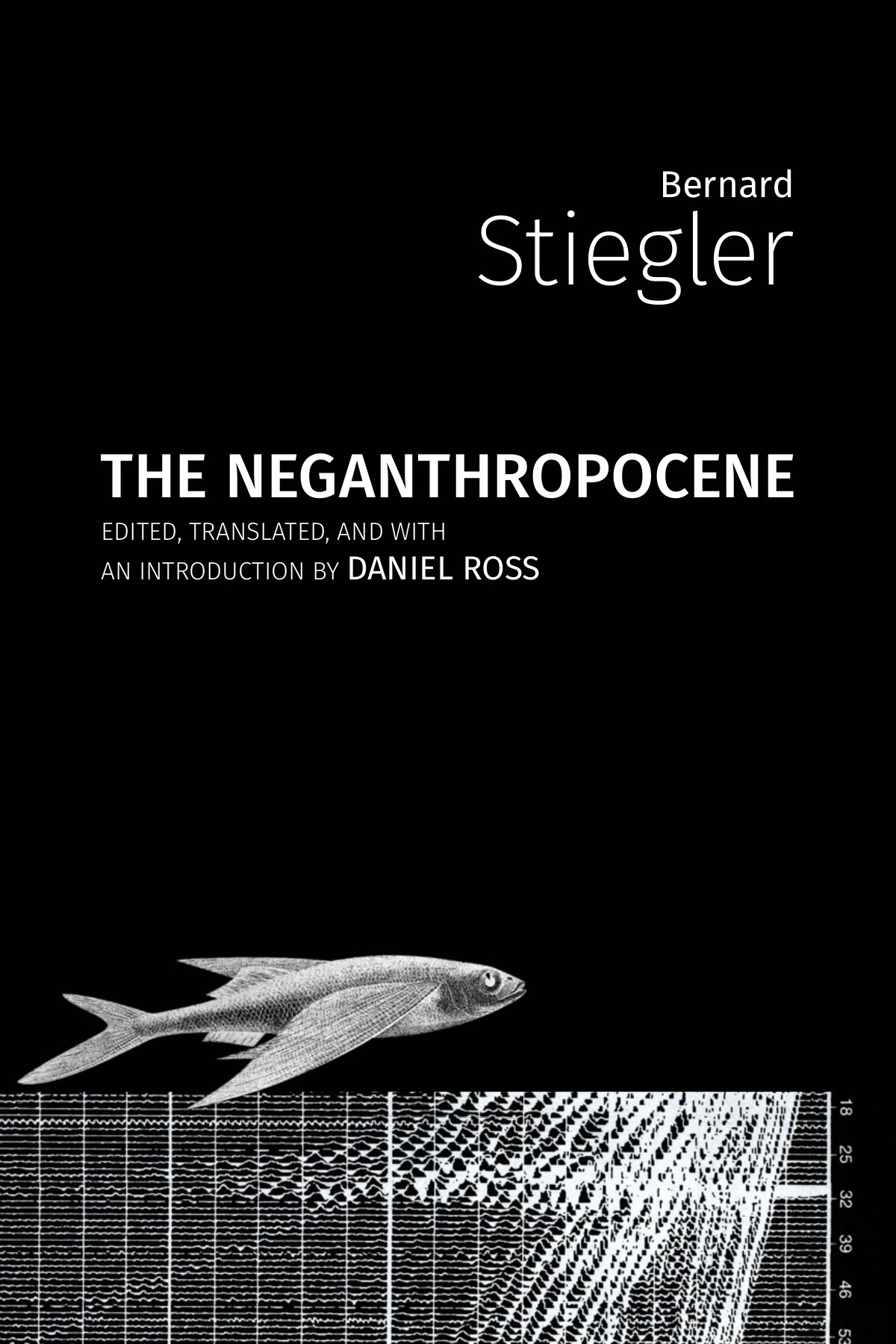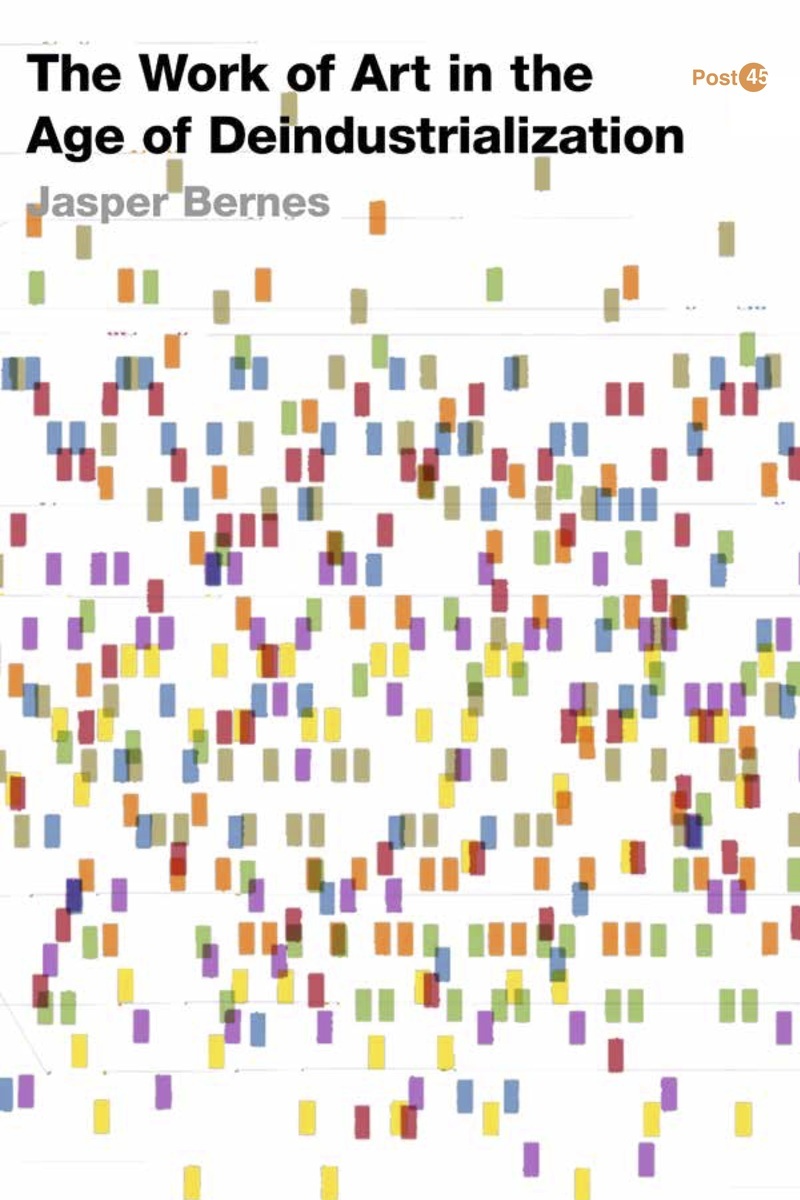Bernard Stiegler: The Neganthropocene (2018)
Filed under book | Tags: · anthropocene, capitalism, cinema, technics, technology, theory

“As we drift past tipping points that put future biota at risk, while a post-truth regime institutes the denial of ‘climate change’ (as fake news), and as Silicon Valley assistants snatch decision and memory, and as gene-editing and a financially-engineered bifurcation advances over the rising hum of extinction events and the innumerable toxins and conceptual opiates that Anthropocene Talk fascinated itself with—in short, as ‘the Anthropocene’ discloses itself as a dead-end trap—Bernard Stiegler here produces the first counter-strike and moves beyond the entropic vortex and the mnemonically stripped Last Man socius feeding the vortex.
In the essays and lectures here titled Neganthropocene, Stiegler opens an entirely new front moving beyond the dead-end “banality” of the Anthropocene. Stiegler stakes out a battleplan to proceed beyond, indeed shrugging off, the fulfillment of nihilism that the era of climate chaos ushers in. Understood as the reinscription of philosophical, economic, anthropological and political concepts within a renewed thought of entropy and negentropy, Stiegler’s ‘Neganthropocene’ pursues encounters with Alfred North Whitehead, Jacques Derrida, Gilbert Simondon, Peter Sloterdijk, Karl Marx, Benjamin Bratton, and others in its address of a wide array of contemporary technics: cinema, automation, neurotechnology, platform capitalism, digital governance and terrorism. This is a work that will need be digested by all critical laborers who have invoked the Anthropocene in bemused, snarky, or pedagogic terms, only to find themselves having gone for the click-bait of the term itself—since even those who do not risk definition in and by the greater entropy.”
Edited, translated, and with an introduction by Daniel Ross
Publisher Open Humanities Press, London, 2018
CCC2: Irreversibility series
Creative Commons BY-SA 4.0 License
ISBN 9781785420481
345 pages
Jasper Bernes: The Work of Art in the Age of Deindustrialization (2017)
Filed under book | Tags: · aesthetics, avant-garde, capitalism, cybernetics, information, labour, literary criticism, marxism, poetry, postindustrial, productivity, taylorism, technology, work

“A novel account of the relationship between postindustrial capitalism and postmodern culture, this book looks at American poetry and art of the last fifty years in light of the massive changes in people’s working lives. Over the last few decades, we have seen the shift from an economy based on the production of goods to one based on the provision of services, the entry of large numbers of women into the workforce, and the emergence of new digital technologies that have transformed the way people work. The Work of Art in the Age of Deindustrialization argues that art and literature not only reflected the transformation of the workplace but anticipated and may have contributed to it as well, providing some of the terms through which resistance to labor was expressed. As firms continue to tout creativity and to reorganize in response to this resistance, they increasingly rely on models of labor that derive from values and ideas found in the experimental poetry and conceptual art of decades past.”
Publisher Stanford University Press, 2017
Post ’45 series
ISBN 9780804796415, 0804796416
viii+231 pages
Reviews: Stevphen Shukaitis (Marx & Philosophy Review of Books, 2017), Julian Murphet (Affirmations, 2017), Vince Carducci (Public Seminar, 2017).
Comment (0)Felix Stalder: The Digital Condition (2016–)
Filed under book | Tags: · algorithm, commons, culture, democracy, digital condition, digital culture, networks, politics, post-democracy, social media, technology, web

“Our daily lives, our culture and our politics are now shaped by the digital condition as large numbers of people involve themselves in contentious negotiations of meaning in ever more dimensions of life, from the trivial to the profound. They are making use of the capacities of complex communication infrastructures, currently dominated by social mass media such as Twitter and Facebook, on which they have come to depend.
Amidst a confusing plurality, Felix Stalder argues that are three key constituents of this condition: the use of existing cultural materials for one’s own production, the way in which new meaning is established as a collective endeavour, and the underlying role of algorithms and automated decision-making processes that reduce and give shape to massive volumes of data. These three characteristics define what Stalder calls ‘the digital condition’. Stalder also examines the profound political implications of this new culture. We stand at a crossroads between post-democracy and the commons, a concentration of power among the few or a genuine widening of participation, with the digital condition offering the potential for starkly different outcomes.
This ambitious and wide-ranging theory of our contemporary digital condition will be of great interest to students and scholars in media and communications, cultural studies, and social, political and cultural theory, as well as to a wider readership interested in the ways in which culture and politics are changing today.”
First published in German as Kultur der Digitalität, Suhrkamp Verlag, Berlin, 2016.
Translated by Valentine Pakis
Publisher Polity Press, Cambridge, UK, 2018
ISBN 9781509519590, 1509519599
xi+204 pages
Reviews (in German)
Comment (0)
